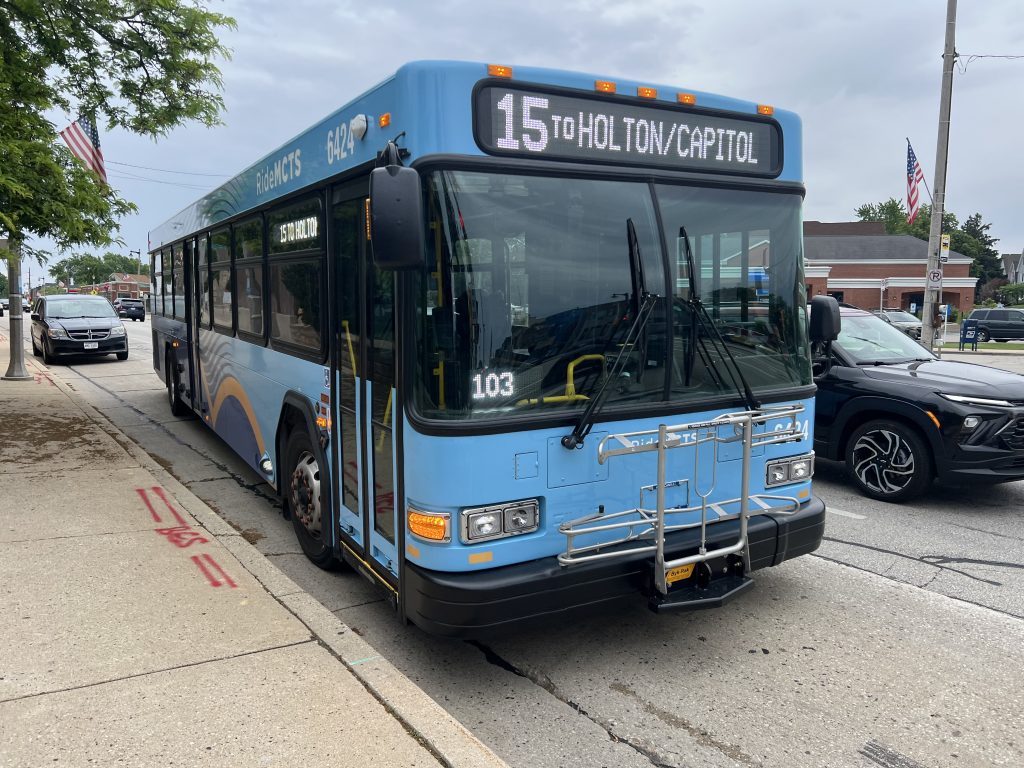Bus System Fare Evasion Plan Gets Chilly Reception
'It doesn't seem like anybody is coming to save the bus.'

6400 series Milwaukee County Transit System (MCTS) bus. Photo by Jeramey Jannene.
For supervisors, and transit union leaders, the Milwaukee County Transit System (MCTS) plan for fare evasion doesn’t quite add up.
There was skepticism of the budgetary estimates and data for the new fare evasion plans presented during a meeting of the Committee on Transportation and Transit Wednesday.
MCTS officials prepared a list of strategies for reducing fare evasion across the system, which is now estimated to be as high as 33% of all riders, according to the report. Supervisors requested a fare evasion plan in July after MCTS shocked them by announcing a $10.9 million operating deficit the month prior. Once the deficit was announced, supervisors started prying into the system finances and learned MCTS estimated that one in four riders don’t pay their fare. That estimate is now up to one in three.
The new bus rapid transit route called the Connect 1 was highlighted as a major source of fare evasion. Riders are still changing habits after the route launched with free fares in 2023. The service also employs off-bus fare validators, which makes it easier to board without paying.
The list of ideas included two cost-neutral plans — public messaging and open-loop payment — which it is already implementing. Other ideas include spending $1.1 million for targeted fare enforcement by the system’s security officers; $1.3 million for fare ambassadors, who will ride buses and remind people to pay their fares; and a reduced fare program for persons unable to pay.
Fare ambassadors represent a “softer approach” to the issue and one that other transit agencies around the country are implementing, said Brittany Bertsch, MCTS director of project management, safety, and security.
“They’re there to educate. They’re there to report broken equipment,” she said. “Some agencies use them to connect individuals with social resources in the community.”
MCTS believes it can collect approximately $900,000 with the cost neutral strategies in the report. But Sup. Justin Bielinski pointed out that MCTS did not estimate how much money could be saved if the board funded strategies like fare ambassadors or using security for targeted fare enforcement.
“It sort of makes it difficult for us to budget anything or to support anything, if we don’t know what the return on investment is,” he said. “So I guess it just feels a little incomplete.”
Sup. Juan Miguel Martinez asked why fare ambassadors were more expensive than security. Bertsch explained that the concept was put together assuming bus operators would be employed as ambassadors. When MCTS used bus ambassadors to introduce the new Connect 1 bus rapid transit route in 2023, the ambassadors were operators who also work as trainers for new hires.
MCTS made it company policy not to ask passengers for their fare when they board the bus. The goal was to reduce conflict and therefore assaults on bus operators. MCTS made no indication it will change this policy. Under the ambassador plan, the bus operator would still not be allowed to ask for a fare, but MCTS would spend $1.2 million to put a second operator on the bus to remind people to pay their fare.
Amalgamated Transit Union Local 998 Vice President Michael Brown didn’t like the idea.
“That’s what we got security for,” he said. “Let’s use those guys.”
MCTS created a new in-house security team in response to years-long advocacy by ATU to improve security on the buses. Union leaders have generally praised the new transit security officers. Fare evasion and bus security have been intertwined since discussions about security began several years ago.
ATU President Bruce Freeman and former president Donnell Shorter both said the policy of not asking for fares has contributed to rampant fare evasion. The problem is driven not only by persons who cannot afford the fare, but also by people who can pay but know they can ride for free.
“So I said over and over, once you let this genie out of the bottle, it’s hard to put it back in,” Shorter said.
2025 Budget Deficit Goes Down
Since announcing the budget deficit in June, MCTS has already started working to bring the budget gap down, notably with major service reductions that went into effect Aug. 24.
Now the latest projections show the system on track for a $9.2 million budget deficit by the end of the year. MCTS is also spending down its remaining COVID-19 funds ahead of schedule to close the budget gap. The system plans to raise fares and cut service in 2026 to prevent another budget deficit. Officials said they did not have any information on magnitude of cuts, yet.
Sup. Shawn Rolland urged transit system leaders to start thinking about, and acting on, any systematic changes that will be required to address the longterm, structural deficit. It seems unlikely the state or federal government will come to the system’s rescue, he said.
“It doesn’t seem like anybody is coming to save the bus,” Rolland said. “So in that reality, we have to save ourselves, so I want to underscore just the urgency for us to act significantly as soon as possible.”
New CEO Pledges New Direction for MCTS
Responding to a question from Sup. Priscilla E. Coggs-Jones, new MCTS CEO Steve Fuentes said “my goal is to help MCTS become the best version of itself that it can afford.”
Coggs-Jones urged MCTS leadership to work more closely with the transit union.
“I’m a firm believer that if you really want to get true results, bring those people who experience it firsthand to those tables of conversations to come up with solutions,” she said. “You have a group of guys, a group of operators and so forth who are willing to do that. It’s just a matter of listening.”
Fuentes was hired by MCTS in July this year. He replaces interim President and CEO Julie Esch who resigned in July following political blowback from the budget deficit announcement. Esch had replaced former managing director Denise Wandke, who resigned and then retired at the end of 2024.
Fuentes worked for three decades at the Chicago Transit Authority, and started his transit career as a bus operator.
“We need to learn from the past, improve the present and build toward the future,” Fuentes told the committee. “That’s what I’m looking to do, bring the company, the agency, into alignment. I feel like, just in looking at MCTS, maybe there’s been a little bit of misalignment, and maybe there hasn’t been enough collaboration with the union.”
Fuentes said he wants MCTS to operate as one cohesive agency, reducing the conflict and the gulf between the rank and-file workers and management.
“We’re the largest transit agency in Wisconsin, and we’re going to begin acting like it,” he said. “We’re going to set the example for other agencies to look at.”
If you think stories like this are important, become a member of Urban Milwaukee and help support real, independent journalism. Plus you get some cool added benefits.
More about the 2025 MCTS Financial Issues
- FTA Tells Milwaukee to Crack Down on Fare Evasion — Even Where Fares Don’t Exist - Graham Kilmer - Dec 12th, 2025
- Transportation: County Names New Director of Transportation - Graham Kilmer - Dec 5th, 2025
- Transportation: MCTS Budget Picture Keeps Getting Worse - Graham Kilmer - Dec 4th, 2025
- Transportation: MCTS Avoids Full Route Cuts Under New Plan - Graham Kilmer - Nov 27th, 2025
- Transportation: Supervisor Pushes Fare Evasion Plan, Tangles With Sheriff - Graham Kilmer - Oct 23rd, 2025
- Transportation: Bus Cuts Leave Some Riders Stranded - Graham Kilmer - Oct 21st, 2025
- Transportation: Emails Reveal MCTS Officials Concealed Budget Deficit From Comptroller, County Board - Graham Kilmer - Oct 10th, 2025
- Transportation: 6 Bus Routes That Could Disappear in 2026 - Graham Kilmer - Sep 30th, 2025
- Transportation: MCTS Reaches New Labor Agreement With Union - Graham Kilmer - Sep 27th, 2025
- Transportation: Rep. Steil Calls For Greater Federal Oversight of MCTS - Graham Kilmer - Sep 17th, 2025
Read more about 2025 MCTS Financial Issues here
Transportation
-
Congestion Pricing Cuts Air Pollution in New York City
 Dec 14th, 2025 by Jeff Wood
Dec 14th, 2025 by Jeff Wood
-
FTA Tells Milwaukee to Crack Down on Fare Evasion — Even Where Fares Don’t Exist
 Dec 12th, 2025 by Graham Kilmer
Dec 12th, 2025 by Graham Kilmer
-
Will GOGO’s Bus Service Ever Get Going?
 Dec 9th, 2025 by Jeramey Jannene
Dec 9th, 2025 by Jeramey Jannene





















I am dependent on public transit. I am disgusted with the current MCTS management and its policies. I am disgusted with the County Supervisors. That Board should have started investigating the MCTS management years ago.
I am especially disgusted with the folks of all ages who evade fares. Like the senior citizen who takes it almost daily to Speedway, stocks up on junk food, and catches it back home. He can’t afford to pay the reduced fare? Kick his entitled white butt off the bus, along with others who ride for free. I am disgusted operators don’t defy the IMO self-defeating policy of not asking for fare. I was happy to hear of an operator who refused a free ride to someone who had just purchased 2 bags of items at an upscale grocer. They can afford pricey food, but are unable to pay bus fare? I wish more operators would defy the official MCTS management policy.
Since folks obviously don’t care about how their selfishness is hurting the entire system, especially those dependent on public transit, I am all for a security guard on every bus. Since the theft is so great, call in the National Guard . Everyone is paying the price for the pathetic MCTS policies and these fare evaders. Put a stop to it now. I am a hard working, law abiding, taxpaying citizen and I am disgusted with how this situation has been handled and what the once great MCTS system has become.
Wouldn’t something like a lockable body turnstile like some subway systems use be effective? Disabled riders would access through an unlockable gate. All others needing transport could do so through OATS (older adult transport services) or Transit Plus.
Maybe it’s time to stop charging fares at all and make buses free (a la The Hop). The cost of collecting fares (maintence of fare equipment, cuts given to credit card providers, and cash-handling expenses) reduces the net revenue. It costs perhaps $2/minute to operate a bus, so even a 1-minute fare-dispute delay costs as much as the evaded $2 fare (not to mention what the delay costs each the other riders).
Other cities have implemented fare-free buses. My biggest concern is whether they would become mobile homeless shelters, but (for some reason) that doesn’t seem to have happened to The Hop.
In days of old…when men were bold…Police Officers used to ride the buses because they walked “beats” and it was common for them to ride the bus along the street to get to them. . And, once upon a time, plain clothed Sheriff deputies were assigned to ride the buses to stop the wilding from students that was rampant. If you violated any rules…You were taken off the bus, tickets were written, or you went to jail. But…people objected to their presence. How is that working for you NOW, Milwaukee???
Dagdad: The County’s budget overruns are from overtime from the sheriff’s office at Milwaukee County Community Reintegration Center (CRC) (formerly the House of Correction) and the County Jail. Wanna pay more taxes? Have sheriff deputies ride the buses! My guess is that the City and it’s police department have similar cost over-runs from overtime, as they don’t have enough police and training classes for officers are not filled to capacity.
If new MCTS CEO Fuentes is serious about improving the system, he should start by taking STRONG action to curb all the fare evaders. How do other area transit companies handle this issue? I know Waukesha Co. calls the cops. Until the current management team took over, MCTS had a security team it called. What are the percentages of fare evaders in Waukesha, Madison, Eau Claire and other WI cities?
I also wonder if the Bucks or Brewers were crying “shortfall” if the esteemed County Board would be more willing to help. I have lost all respect for local politicians. They are not willing to help taxpaying citizens dependent on public transit to get to jobs, grocers, appointments in a timely matter. Yet they want our vote.
And I still hope against hope that some news organization will do an investigative report on why Waukesha County Transit paid more and went with a different management company rather than go with the lower bid and get the same management that MCTS has. There must be a reason, and why no news organization is exploring it also raises questions.
As stated previously, am totally disgusted with this unfortunate situation that is affecting my quality of life. But what can I expect? After all, this country chose to elect a convicted felon to the highest office in the land.
I’m concerned that a fare-paying rider might take exception to evaders and start a confrontation that would get out of control and put others at risk. Addressing this possibility should be part of whatever plan is considered.
On Saturday, was taking the Connectt 1 to the Route 60, and the bus was full of those going to the Brewers game. All but 2 Brewer fans evaded their fare. Wonder if they found a way to sneak into the game free of charge too. I’m sure the Brewers have much better management than does MCTS. I also had to wait 45 minutes for a bus Saturday. I blame that on the fare evaders and the shoddy management at MCTS.